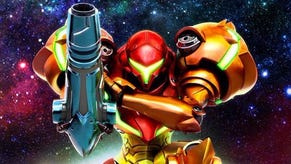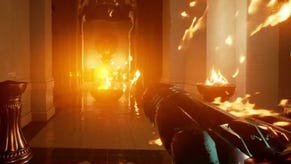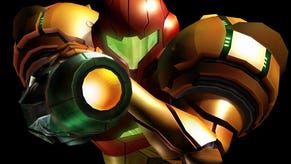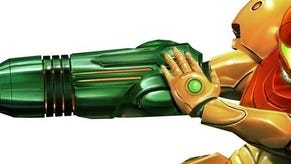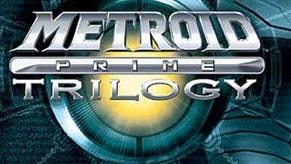Metroid Prime Trilogy
Series of the decade?
They could be real pad-bouncers, too. The murderously unnecessary requirement to restart boss encounters at the most recent save point would sometimes mean a lengthy trudge across the map to even reach the boss' location, never mind replay the damned thing. The chief flaw in the games, this unfortunate throwback to old-school game design remains in all three Metroid Prime titles, and still has the capacity to inspire the kind of red mist you maybe thought you'd grown out of. Losing maybe an hour of patient progress because you've neglected to save, and then stumbled unprepared across a boss is a cruel and - these days - unusual punishment.
Nevertheless, the improvements to both Metroid Prime and Metroid Prime 2: Echoes are worth celebrating. The slick controls, combined with lock-on free aiming, make them a joy to play - and in some senses, slightly easier.
The originals' curious decision to forgo the standard twin-stick console control system in first-person mode meant that players had to hold down the right shoulder button to look around. These days, you simply point the remote to aim, and move around with the nunchuk, turning by pointing at the sides of the screen. Combined with the ability to easily lock on to a target with Z, and dash-evade by tapping B, it's a system which feels as precise as you'd hope without being ache-inducing. Factor in the rebalancing of some of the more insanely difficult enemies, and you end up with games which stay on the right side of challenging.
A few improvements that made Corruption feel more refined have not made the transition to either Metroid Prime or its sequel, however. Most obviously, the expanded on-screen mini-map that made navigating the sprawling environments in Corruption so much easier hasn't been retrofitted to 1 or 2.
But even without refinement, I would still rate both GameCube Primes ahead of the series' concluding part. Corruption suffered for the simple reason that Retro had started to run out of ideas. If it felt contrived having to find all of Samus' gear in Echoes, having to do it yet again the third time around was stretching the formula. With hindsight, it was the excellent controls which helped us tolerate the repetition, but playing them back-to-back now, Corruption can't help but feel stale by comparison. An over-reliance on novelty motion controls creeps into the game, and the boss design also suffers, with certain elements contrived as a means to show off the controller - while the addition of voiceovers to the NPCs jarred with the Metroid atmosphere.
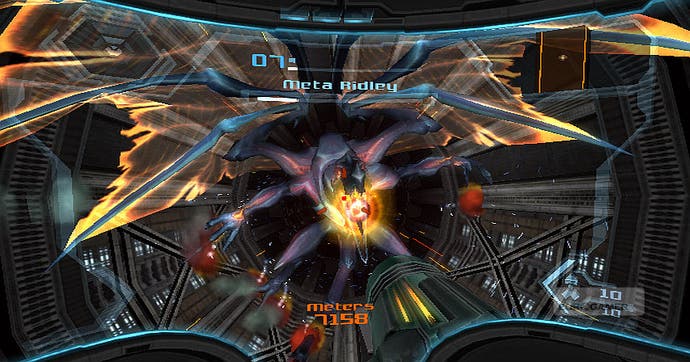
What's surprising about the first two Metroid Prime games is how little they've aged technically. While it can be horrifying to go back to games from a previous generation on bigger, sharper screens, Retro's titles still stand out for their visual opulence. With fantastic world design and a varied selection of imaginative creatures populating the various worlds, the satisfaction to derive from discovery and exploration is immense. And with widescreen support and a modicum of texture improvement in evidence, you'll still find yourself enchanted by some of the most well-realised game-worlds ever created.
Unlike so many linear action adventures, these are environments you'll get to know intimately, thanks to the ever-present need to revisit them to scour previously inaccessible areas for secrets, upgrades, or simply to make progress. The requirement to continually criss-cross environments in Metroid Prime games might seem a cheap way to pad them out, but it's actually part of their enduring appeal.
The way the games drip-feed their narrative is also contrary to tradition. Equipped with a scan visor, you'll need to scan everything to find out anything at all about the story: dead bodies, equipment, adversaries, the works. To begin with it feels a bit unnecessary, but again, once you're immersed, it can become a curious compulsion. You learn so much more about the world and its inhabitants this way, and after a while you actually find yourself caring more too. Somewhere along the line, the Metroid Primes transcend from mere action games to beautifully-crafted works of interactive science-fiction.
Laid end-to-end, you're looking at maybe as much as 100 hours of top-quality entertainment in Metroid Prime Trilogy. Although it's hardly been spoken of as a high-priority release by Nintendo, this could well be the finest single product it has released for the Wii. For all its quirks, Metroid Prime remains a landmark action series, and as such, owning it ought to be mandatory.

